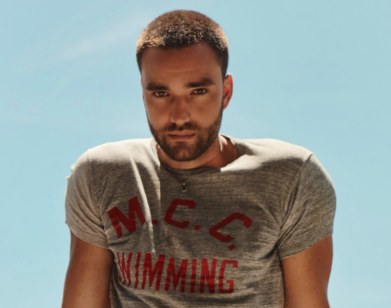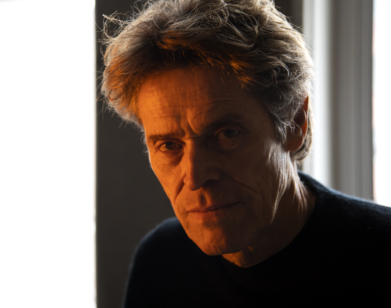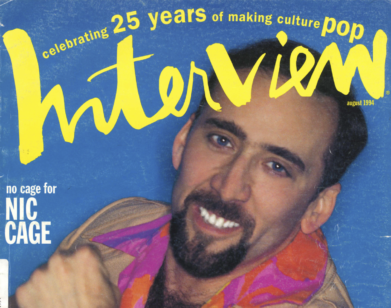REMAKE
Nathalie Emmanuel Tells Omar Sy About Life On Set With Francis Ford Coppola

Nathalie Emmanuel, photographed by Myles Pettengill.
This year, Nathalie Emmanuel and Omar Sy were recently faced with a lofty task: how do you handle the pressure of remaking a classic? Starring in John Woo’s update of his ‘80s action hit The Killer, the two played the gender-reversed protagonists, with Emmanuel as the unsuspectingly demure assassin and Sy as the tenacious and charming cop hot on her trails. “She’s her own woman. I didn’t want to try and recreate something, because it wouldn’t have made sense,” Emmanuel told Sy on Zoom last month. The British Game of Thrones stars had just made her rounds for the release of Francis Ford Coppola’s epic and long-awaited Megalopolis, where she stars alongside Hollywood-heavyweights Giancarlo Esposito, Adam Driver and Aubrey Plaza. In conversation, Emmanuel got to talking about the ins-and-outs of working on set with a master—and keeping his secrets. “I just say nothing,” she explained. “I’m a vault.”
———
OMAR SY: Hello, Nathalie. How are you?
NATHALIE EMMANUEL: I’m very well.
SY: Do you remember the first time we met?
EMMANUEL: I do. It was at the production office for The Killer and we were reading some scenes with John Woo, obviously.
SY: Yeah.
EMMANUEL: I remember it mostly because Tato came running in first and he’s so cute. I was just so overwhelmed by the dog. Then you came in and I was like, “Wait, who is this celebrated, phenomenal actor?” What was really nice about our first meeting was that we both walked in really receptive and warm.
SY: I remember that too. Also, our expectations around John were also the same. We were really excited, and happy, and pretending everything is cool.
EMMANUEL: Yeah, basically.
SY: Okay, I have a second question. You’ve worked on projects with massive fan bases, like Game of Thrones and Fast and Furious. How do you mentally shift when you join something more niche, like Megalopolis?
EMMANUEL: That’s an interesting question. With Game of Thrones, I came in at season three so it was already very established. The fan base was already there, and there was an expectation of what the show was and the quality of it. It really inspires you to be the best you can be, because you know how much people love it. I remember when I got the audition I was like, “Yay, I’ve got the call!” But once I came down, I was like, “What if I ruin it? I love the show so much, I’m going to be the one that messes up.” But you just have to do the work and prepare as if you would with any other character. Game of Thrones was much more of a traditional process, whereas Francis [Ford Coppola] is very unconventional in his approach. I feel like the fandom and the kind of epicness is still there with Francis, but in a different way. I had to prepare mentally to step up and not be intimidated by the size of it. With Francis, there’s lots of experimenting. Sometimes he would just want you to improvise and other times he’d want you really on the script.
SY: What was the most fun or surprising thing you experienced working with him?
EMMANUEL: The most fun thing was, he’s a big fan of theater games to get people to relax and not overthink or take themselves too seriously. I wasn’t really expecting that. There’s a few of them that end up in the film as well.
SY: Oh, yeah?
EMMANUEL: There’s a whole sequence where I’m following Caesar through the backstage of an arena, there’s all these different circus performers and it’s as if we’re attached by a rope and I’m trying to hold onto him. That’s the metaphor of the scene. But initially, I’m just following him around and then he cuts me loose and escapes from me. And that was just an exercise that we tried, and then Francis was like, “I kind of want to do that.”
SY: That’s cool. And what’s the most surprising, would you say?
EMMANUEL: Francis sometimes has a really clear vision of what he wants for a shot or a specific scene, so he’s not averse to really, really rigorous rehearsal. But then sometimes he would come into work or come into the set and not really know what was going to happen, and the scene would expose itself just through play or through discovery. And that can throw up its challenges, of course, because we’re all trying to work out what’s inside this man’s mind that’s been percolating for 40 years. So that was a really different way to work. Because you know how it is: often you get to set, you all stand around and you run the lines together, and then you might go into the space where the director will tell you where he thinks you should be. And then you run it again, and you might change it a bit. There’s quite a clear system that happens, but Francis often doesn’t work that way.
SY: What did you take away from shooting with someone like Francis Coppola, one of the masters?
EMMANUEL: What I took from that is that play is really important, especially for actors. It’s very easy for us to overthink things and get really in our heads, but the play and exploration really invites possibility or potential. It just causes you to relax and get into your body and out of your head, just sort of go with the flow a bit more. And even if that’s not your usual way, I think it is okay to explore what that feels like. And it might throw up something surprising that you can then use in the scene.
SY: Yeah, and you don’t expect it. Play is the key word, actually. That’s really good.
EMMANUEL: Yeah. Imagination and play opens up the mind. I’ll be honest, improvising is not always the most comfortable for me. I’ve done it over the years, but not in a sort of dedicated way. So it was definitely scary, I was very out of my comfort zone in those playful moments.
SY: Did you feel the pressure when you’re surrounded by a heavyweight like Adam Driver or Giancarlo Esposito? Do you absorb their energy or do you have a method to keep yourself grounded?
EMMANUEL: I was obviously very excited to work with these actors. And just like any set, you walk into it, you’ve got different personalities, a different process, and you just want to be a good teammate. You want to give them something that they can find useful and collaborative, but it’s also okay to feel the size of these actors. It would have been incredibly easy for me to be intimidated by that, but at the end of the day we’re human beings, we’re all there to serve this purpose and this man’s vision, and everybody seemed to really believe in that. Everyone was very kind and respectful, and the camaraderie was really strong. I just had to lean on my own experience and my own prep. That’s all we can do.
SY: And how was it compared to working with another heavyweight, like me?
EMMANUEL: Like you?
SY: Yeah.
EMMANUEL: Well, it was actually much easier, to be honest. I didn’t even know what I was going to do when I was working with Omar Sy. I mean, there is no comparison.
SY: Thank you. I wanted to hear that.
EMMANUEL: The incomparable Omar Sy, everybody.
SY: Merci, Nathalie. So with Megalopolis, how did it feel to have to keep it under wraps the whole time?
EMMANUEL: Listen, I was on Game of Thrones for seven years, so I’m good at keeping big storylines under wraps. When Jon Snow died, Jesus, that was the worst summer ever.
SY: Well we know that you can do it, but we want to know how you do it.
EMMANUEL: I just say nothing. I’m a vault. I’m like, “Don’t even ask me.”
SY: But people ask because they’re excited. So do you leave the room?
EMMANUEL: I have to keep my mouth shut because, first of all, what if I ruin it for everyone? Second of all, what if this production or this massive company sues me because I’ve ruined a major storyline? I just stay at home, that’s what I do.
SY: I’ll probably do that, because it’s really hard.
EMMANUEL: You must have had that many times yourself.

Nathalie Emmanuel, photographed by Myles Pettengill.
SY: I had never had a project with that expectation. You have also collaborated with John Woo, which is how we met, then Francis. They have such monumental careers. How do you receive the news that you’d be working with them?
EMMANUEL: With excitement. Lots of it. But I think at the end of the day, it’s a mental game for me. You can so easily be overwhelmed by the size and legacy of the director. But when I approach any new director, it’s important to get an assessment of how they like to work and what their process is, and then share how you need to be directed as well. You have to find that middle ground, and sometimes that’s easier than other times, for sure. Immediately with Francis I knew that it was going to be very spontaneous and on the fly and could change up quite quickly. And then with John, as you now know, he’s got very clear moves with the camera and he wants to give the actors a lot of space as well. I think it’s about just staying open.
SY: When you had the role of Chow Yun-fat on The Killer, how did you approach remaking this character that was already so famous?
EMMANUEL: Obviously, I know the size and legacy of The Killer. It’s a really great movie and Chow Yun-fat is a legend. So again, it’s very easy to be intimidated by that. But I really felt like in our re-imagining of The Killer, Zee was something else. She’s her own woman. I didn’t want to try and recreate something, because it wouldn’t have made sense. I really took this as a new thing. Even just some of the coolness and swagger that Chow Yun-fat has, I wanted to bring a little bit of that, but also bring some of her. With Zee, you would never know that she’s this violent, dangerous woman. So that gave me ideas, but I wasn’t trying to copy and paste.
SY: No, you really didn’t. You did something totally different, but at the same time the core and everything with that form is still there. You were perfect.
EMMANUEL: Oh, merci.
SY: Also, in The Killer, we have so many incredible locations. What has been your favorite set experience based on location?
EMMANUEL: I mean, gosh, Paris was pretty wonderful. We also went to a lot of really cool places in Game of Thrones. We traveled around to Croatia and Spain. In my first season we shot a lot in Morocco, in Ouarzazate. We were in that Ridley Scott Studios set that he had down there for The Kingdom of Heaven, I think. It was epic, and it’s literally in the middle of the desert. I remember in my first season, when Daenerys had just burned down the slave city where she met me and got her army, there’s this moment where they’ve lit all these fires and there’s all these people on horseback and it was complete chaos. I suddenly had an out-of-body moment where I was like, “This is what I’m doing today, really?!” It was really cool. There was something about having the vast desert, it’s just endless.
SY: It was your first season?
EMMANUEL: That was my first season. And I was like, “Wow.” There must have been 400 people. It felt that big, I don’t know if it was. I was just so excited by that image. I can literally see it when I close my eyes. Before that, the sort of jobs that I’d done were like TV shows that were set in a village, so it was the school set, my house set. It was all just very modern TV. So to be in that kind of level of epic worlds was so amazing. It gives me goosebumps when I think about that moment. And I was like, “This is some next level shit.”
SY: So we also have our assassin game, The Killer. Boom, boom, boom.
EMMANUEL: Assassin game, yeah. Basically, you have to act out different ways of how to kill the other person without them seeing you approach, right?
SY: Exactly.
EMMANUEL: It could just be a gun, but I quite like a bow and arrow. In my kind of fantasy character, that’s my weapon of choice.
SY: Yeah.
EMMANUEL: I always said that if Missandei [Emmanuel’s character in Game of Thrones] had to pick up a weapon, it would be that. And they were like, “But she’s so kind and gentle, she doesn’t pick up weapons.” Anyway, that game started with you guys, and it’s very funny because it’s gone international now. Specifically at my screening of Megalopolis at Cannes. I’m walking down the aisle and I see him appear, and he assassinated me at my own premiere. I don’t know if that’s within the rules.
SY: It’s not completely in the rules.
EMMANUEL: We need to have a point system.






